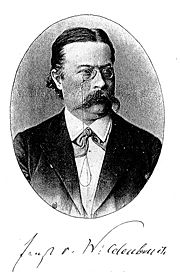
Ernst von Wildenbruch
Encyclopedia

Germany
Germany , officially the Federal Republic of Germany , is a federal parliamentary republic in Europe. The country consists of 16 states while the capital and largest city is Berlin. Germany covers an area of 357,021 km2 and has a largely temperate seasonal climate...
poet
Poet
A poet is a person who writes poetry. A poet's work can be literal, meaning that his work is derived from a specific event, or metaphorical, meaning that his work can take on many meanings and forms. Poets have existed since antiquity, in nearly all languages, and have produced works that vary...
and dramatist.
Biography
Wildenbruch was born at BeirutBeirut
Beirut is the capital and largest city of Lebanon, with a population ranging from 1 million to more than 2 million . Located on a peninsula at the midpoint of Lebanon's Mediterranean coastline, it serves as the country's largest and main seaport, and also forms the Beirut Metropolitan...
in Lebanon
History of Lebanon under Ottoman rule
The Ottoman Empire at least nominally ruled Lebanon from its conquest in the sixteenth century until the end of World War I in 1918.The Ottoman sultan, Salim I , invaded Syria and Lebanon in 1516. Salim I, moved by the eloquence of the Lebanese ruler Amir Fakhr ad Din I , decided to grant the...
, the son of the Prussia
Prussia
Prussia was a German kingdom and historic state originating out of the Duchy of Prussia and the Margraviate of Brandenburg. For centuries, the House of Hohenzollern ruled Prussia, successfully expanding its size by way of an unusually well-organized and effective army. Prussia shaped the history...
n consul-general, Ludwig von Wildenbruch
Ludwig von Wildenbruch
Anton Albert Heinrich Ludwig von Wildenbruch was the Prussian consul general in Beirut in the mid-19th century. He was also the Prussian ambassador to Constantinople from . An amateur scientist, his reports were published in various learned journals of the time.Wildenbruch was an illegitimate son...
. Having passed his early years at Athens
Athens
Athens , is the capital and largest city of Greece. Athens dominates the Attica region and is one of the world's oldest cities, as its recorded history spans around 3,400 years. Classical Athens was a powerful city-state...
and Constantinople
Constantinople
Constantinople was the capital of the Roman, Eastern Roman, Byzantine, Latin, and Ottoman Empires. Throughout most of the Middle Ages, Constantinople was Europe's largest and wealthiest city.-Names:...
, where his father was attached to the Prussian legation, he came in 1857 to the Kingdom of Prussia
Kingdom of Prussia
The Kingdom of Prussia was a German kingdom from 1701 to 1918. Until the defeat of Germany in World War I, it comprised almost two-thirds of the area of the German Empire...
, received his early schooling at the Padagogium at Halle
Halle, Saxony-Anhalt
Halle is the largest city in the German state of Saxony-Anhalt. It is also called Halle an der Saale in order to distinguish it from the town of Halle in North Rhine-Westphalia...
and the Französische Gymnasium in Berlin
Berlin
Berlin is the capital city of Germany and is one of the 16 states of Germany. With a population of 3.45 million people, Berlin is Germany's largest city. It is the second most populous city proper and the seventh most populous urban area in the European Union...
, and, after passing through the cadet school, became, in 1863, an officer in the Prussian Army
Prussian Army
The Royal Prussian Army was the army of the Kingdom of Prussia. It was vital to the development of Brandenburg-Prussia as a European power.The Prussian Army had its roots in the meager mercenary forces of Brandenburg during the Thirty Years' War...
.
Two years later Wildenbruch abandoned his military career, but was recalled to the colors in 1866 for the Austro-Prussian War
Austro-Prussian War
The Austro-Prussian War was a war fought in 1866 between the German Confederation under the leadership of the Austrian Empire and its German allies on one side and the Kingdom of Prussia with its German allies and Italy on the...
. He next studied law at the University of Berlin, and again served in the army during the Franco-Prussian War
Franco-Prussian War
The Franco-Prussian War or Franco-German War, often referred to in France as the 1870 War was a conflict between the Second French Empire and the Kingdom of Prussia. Prussia was aided by the North German Confederation, of which it was a member, and the South German states of Baden, Württemberg and...
(1870–71).
In 1876 Wildenbruch was attached to the foreign office, which he finally quit in 1900 with the title of counsellor of legation. He achieved his first literary successes with the epics Vionville (1874) and Sedan (1875). After publishing a volume of poems, Lieder und Balladen (1877), he produced, in 1882, the tragedy
Tragedy
Tragedy is a form of art based on human suffering that offers its audience pleasure. While most cultures have developed forms that provoke this paradoxical response, tragedy refers to a specific tradition of drama that has played a unique and important role historically in the self-definition of...
Die Karolinger.
Among Wildenbruch's chief dramas may be mentioned the tragedy Harold (1882); Die Quitzows (1888); Der Generalfeldoberst (1889); Die Haubenlerche (1891); Heinrich und Heinrichs Geschlecht (1895); Die Tochter des Erasmus (1900); and König Laurin (1902).
Wildenbruch was twice (in 1884 and 1896) awarded the Schiller Prize, and was, in 1892, created a doctor of philosophy honoris causa by the university of Jena
Jena
Jena is a university city in central Germany on the river Saale. It has a population of approx. 103,000 and is the second largest city in the federal state of Thuringia, after Erfurt.-History:Jena was first mentioned in an 1182 document...
. He also wrote several volumes of short stories (Novellen, 1883; Neue Novellen, 1885; Tiefe Wasser, 1897, and others).

